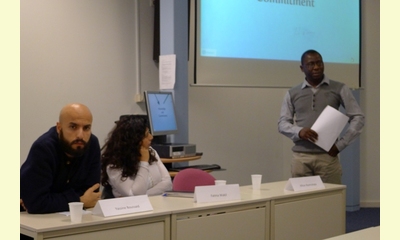|
|
Democratic Transitions and the Role of Youth: A Debate
an article by Lenka Valacsaiova, UNOY Peacebuilders
On Thursday, 22nd September 2011 a debate on "Youth participation in democratic transitions" took place at the International Institute of Social Studies (ISS). The panel was composed of Hilton Nyamukapa, a student of MA Development Studies at the ISS; Fatma Wakil, from the Afghan Youth Foundation (Keihan) and Yassine Boussaid with a Dutch-Moroccan cultural entrepreneur.

click on photo to enlarge
According to Hilton, the Arab spring was initiated by youth, who used social media, such as Facebook, Twitter and My Space. The use of social media opened the minds all over the world on issues which youth are fighting for in Arab countries. The importance of social media in the civil war was recognized even by the government, which tried to disconnect the internet for couple of days.
A question emerged, what is actually the interest of "developed countries" in raising democracy in "developing countries". Yassine suggested that the Western Countries, such as USA and countries of Western Europe see the matter of "democratizing" the Third World countries as injecting a set of their moral values and principles. This practice seems to be vague and contra productive, since it creates paradoxes in the early democracies.
Fatma pointed out that there was a historical strong parliamentary structure in Afghanistan. However, a presidential model of government has been established on the example of USA after the last war with Taliban. This artificial establishment brought a very weak government and a lot of difficulties in distribution of power. Therefore, it is very important to recognize the importance of political and historical background and there is also a need to incorporate the view of citizens, especially the youth.
The last discussed issue concerned the way, how to create space for young people to influence in democratic transitions. Yassine highlighted the experience of the Moroccan Kingdom. According to Yassine, there have been introduced lots of space to discuss the main issues in the society. Therefore, the Arab Spring did not cause serious consequences on ruling authorities. The Moroccan youth is encouraged to address their problems, unless they challenge the kingdom itself. Hilton concluded that it is necessary the positive engagement and subscription of youth to democracy.
At the end of the debate, it has been agreed that there should be introduced strategies for youth participation on social life, where each group would be represented.
|








|
DISCUSSION
Question(s) related to this article:
How can youth be engaged in democratic transitions?,
* * * * *
Latest reader comment:
The youth in the article Democratic Transitions and the Role of Youth: A Debate are good examples:
Hilton Nyamukapa has recently taken part on a conference on Social Media and Youth Participation located in Amman, Jordan. Fatma Wakil has been actively involved within the Afghan community in the Netherlands as the chairperson of the KEIHAN, Afghan Youth Foundation. Yassine Boussaid is interested in connecting local issues to international organisations and improving the quality of life of the Moroccan and Turkish suburbs of Amsterdam.
Hilton concluded that it is necessary to the positive engagement and subscription of youth to democracy. The youth are often manipulated for a better picture in the media. Hilton cited the memorable injunction of the former President of USA, John F. Kennedy: "Ask not what your country can do for you--ask what you can do for your country." Hilton highlighted the urge to involve youth in the whole democratic process and give them the opportunity to participate in public life.

|
|









